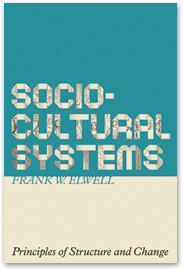
Sociocultural Systems: Principles of Structure and Change Macrosociology: Four Modern Theorists A Commentary on Malthus" 1798 Essay as Social Theory Great Classical Social Theorists In the Classical Tradition: Modern Social Theorists Dr. Elwell's Professional Page
|
Herbert Spencer's Evolutionary Sociology Karl Marx | |
|
Karl Marx: A Brief Introduction
By Frank W. Elwell
Karl Marx (1818-1883) is a difficult theorist to write about. A good deal of the problem is that he has become a major figure in history. As such, he has inspired social movements and individual revolutionaries--some of whom have been faithful to his work, while many more have misused his name and writings. In the not too distant past, the professor teaching Marx had to deal with the cold war and anti-Communist attitudes that students would bring to class. Not only would these students have many misconceptions of Marx's thought and theory--equating it with the Communist Parties of the old Soviet Union and other totalitarian societies-- many would be actively hostile to learning anything about it. Since the end of the cold war, students are usually not active anti-Communists but they still tend to equate Marx with Communism, thus assuming that his thought has been thoroughly rejected and relegated to the dustbin of history. In this essay I do not want to deal with the issue of historical Communism. Marx died well before the revolution in Russia. While he inspired many of the revolutionaries, he bears little of the responsibility for the totalitarian regime that emerged (to explain the Soviet government, look to the Czarist regimes). Marx is not Stalin.
A related problem with writing about Marx is the multiple roles he played
during his lifetime. Marx was a socialist prophet, a social theorist, and a
political organizer. "The philosophers have only interpreted the world in
various ways; the point however is to change it” (Marx 1845/1999). As a
prophet he forecast the eventual revolution of the working class, the
destruction of capitalism, and the establishment of a stateless, socialist
society.
Many of his followers admire him deeply, considering his thought an
exemplary expression of humanism and compassion for
But here we will focus almost exclusively on Marx as a social theorist. As a
theorist, his writings have had an enormous impact on all of the social
sciences. His most significant contribution is in
establishing a conflict model of social systems. Rather than conceiving
of society as being based on consensus, Marx's theory posits the domination
of a powerful class over a subordinate class. However, this domination is
never long uncontested. It is the
fundamental antagonism of the classes which produces class struggle that
ultimately transforms sociocultural systems. "The history of all
hitherto existing society is the history of class struggles" (Marx and
Engels 1962, 34). The engine of sociocultural change, according to Marx, is
class struggle. Social conflict is at the core of the historical process.
A second significant contribution is that Marx locates
the origin of social power in the ownership or control of the forces of
production (also referred to as the
means of production).
It was Marx's contention that the production of economic goods--what is
produced, how it is produced, and how it is exchanged--has a profound effect
on the rest of the society. For Marx, the entire sociocultural system is
based on the manner in which men and women relate to one another in their
continuous struggle to secure needed resources from nature.
A third contribution to the social sciences lies in
Marx's analysis of capitalism and
its effects on workers, on capitalists themselves, and on entire
sociocultural systems. Capitalism as an historical entity was an
emerging and rapidly evolving economic system. Marx brilliantly grasped its
origin, structure, and workings. He then predicted with an astonishing
degree of accuracy its immediate evolutionary path. Each of these
contributions goes beyond the narrow confines of formal Marxist theory. One
need not accept Marx whole cloth in order to integrate his insights into a
coherent world-view. Much of his thought is essential in understanding
sociocultural systems and thus human behavior.
However, men and women are perpetually dissatisfied animals. Our struggle
against nature does not cease when we gratify these primary needs. The
production of new needs evolve (secondary needs) when means are found to
satisfy our primary needs. In order to satisfy these primary and secondary
needs, Marx argued, men and women form societies. The first of these
societies, communal in nature, were based on a very limited division of
labor.
All social institutions are dependent upon the economic base, and a thorough
analysis of sociocultural systems will always reveal this underlying
economic arrangement. The way a society is organized to meet material needs
will profoundly affect all other social structures, including government,
family, education, and religious institutions. "Legal relations as well as
the form of the state are to be grasped neither from themselves nor from the
so-called development of the human mind, but have their roots in the
material conditions of life... The anatomy of civil society is to be sought
in political economy (Marx & Engels 1962, 362). (The "so-called general
development of the human mind" is a reference to August Comte's evolutionary
theory which centered upon the evolution of ideas.)
The means of production is the most powerful factor influencing the rest of
the social system. Like all the great macro social theorists, Marx regarded
society as a structurally integrated system. Consequently, any aspect of
that whole, whether it be legal codes, systems of education, art, or
religion, could not be understood by itself. Rather, he believed that we
must examine the parts in relation to one another, and in relation to the
whole. For a more extensive discussion of Marx’s theories refer to Macro Social Theory by Frank W. Elwell. Also see Sociocultural Systems: Principles of Structure and Change to learn how his insights contribute to a more complete understanding of modern societies.
Bibliography:
Elwell, F. (2009), Macrosociology: The Study of Sociocultural Systems.
Lewiston: Edwin Mellen Press.
Elwell, F. (2013), Sociocultural Systems: Principles of Structure and
Change. Alberta: Athabasca University Press.
Engels, F. 1847. The Principles of Communism, (P. Sweezy, Trans.),
http://www.marxists.org/archive/marx/works/1847/11/prin-com.htm
Engels, F. 1883. “Eulogy for Marx.” Retrieved March 22, 2008, from 1883: The
Death of Karl Marx:http://www.marxists.org/archive/marx/works/1883/death/dersoz1.htm
Marx, K. 1847/1999. The Poverty of Philosophy. Retrieved March 19,
2008, from Marx/Engels Archiveshttp://www.marxists.org/archive/marx/works/1847/poverty-philosophy/index.htm
Marx, K. and Engels, F. 1848. The Communist Manifesto. (F. Engels,
Trans. and Ed.) Public Domain Books, Kindle Edition, (2005).
Marx, K. 1867/1887. Das Kapital Volume I (Capital). (S. Moore and E.
Aveling, Trans.) Public Domain Books, Kindle Edition (2008-11-19).
Marx, K. 1894/1991. Capital: Volume III. (D. Fernbach, Trans.) New
York: Penguin Books.
Marx, K., and Engels, F. 1962. Selected Works, 2 Vols. Moscow:
Foreign Language Publishing House.
Marx, K. 1964. Selected Writings in Sociology and Social Philosophy. (T.
Bottomore, Trans. and Ed.) London: McGraw-Hill.
Marx, K. 1964b. Early Writings. (T. B. Bottomore, Trans. and Ed.) New
York: McGraw-Hill.
Referencing
this Site:
Should you wish to quote from this material the format should be as
follows:
Elwell, Frank, 2013, "Karl Marx: a brief introduction," Retrieved August 28,
2013 [use actual date],
©2005 Frank Elwell, Send comments to felwell at rsu.edu
|
 his fellow human beings.
Some have characterized him as the "last of the old testament prophets." In
his role as a prophet, he expressed a deep conviction that humankind would
someday create a paradise on earth, one in which we would live in
brotherhood, sharing our talents and our wealth. Not only did he have a
belief in the possibility of such a utopia, he considered it inevitable. His
belief, of course, bears striking similarities to the Christian belief in
the establishment of an earthly paradise (though absent the Second Coming).
As a political organizer (and propagandist) Marx wrote to inspire men and
women to immediate action rather than thought. While he wove his prediction
and calls to action into his analyses of capitalist society, the revolution
and its socialist aftermath are clearly the most speculative parts of his
theoretical structure--prophesized perhaps more in hope and faith than in
rigorous analysis. Rejecting this vision of an inevitable and workable
socialist society, there is still much of value and use in Marx's analysis
of capitalism.
his fellow human beings.
Some have characterized him as the "last of the old testament prophets." In
his role as a prophet, he expressed a deep conviction that humankind would
someday create a paradise on earth, one in which we would live in
brotherhood, sharing our talents and our wealth. Not only did he have a
belief in the possibility of such a utopia, he considered it inevitable. His
belief, of course, bears striking similarities to the Christian belief in
the establishment of an earthly paradise (though absent the Second Coming).
As a political organizer (and propagandist) Marx wrote to inspire men and
women to immediate action rather than thought. While he wove his prediction
and calls to action into his analyses of capitalist society, the revolution
and its socialist aftermath are clearly the most speculative parts of his
theoretical structure--prophesized perhaps more in hope and faith than in
rigorous analysis. Rejecting this vision of an inevitable and workable
socialist society, there is still much of value and use in Marx's analysis
of capitalism.
 These classless societies in which men hunted and women and children
gathered vegetables, tubers, and grains were egalitarian in nature. With the
domestication of plants and animals, the division of labor begins to emerge
in human societies. The division of labor, or increasing specialization of
roles and crafts, eventually gives people differential access to resources,
skills, and interests. This division eventually leads to the formation of
antagonistic classes, the prime actors in human history. From this point on,
humans engage in antagonistic cooperation in order to meet their primary and
secondary needs. "By thus acting on the external world and changing it, he
at the same time changes his own nature” (Marx, 1887/1999, 174).
These classless societies in which men hunted and women and children
gathered vegetables, tubers, and grains were egalitarian in nature. With the
domestication of plants and animals, the division of labor begins to emerge
in human societies. The division of labor, or increasing specialization of
roles and crafts, eventually gives people differential access to resources,
skills, and interests. This division eventually leads to the formation of
antagonistic classes, the prime actors in human history. From this point on,
humans engage in antagonistic cooperation in order to meet their primary and
secondary needs. "By thus acting on the external world and changing it, he
at the same time changes his own nature” (Marx, 1887/1999, 174).
